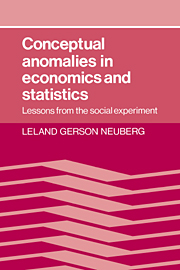Book contents
- Frontmatter
- Contents
- Preface
- Introduction
- PART I STATISTICAL LOGICS
- PART II ECONOMIC LOGICS
- Chapter 5 Problems with a rationalist account of classical mechanics
- Chapter 6 Microeconomics striving to be a classical-mechanics–like science
- Chapter 7 The income maintenance experiments: microeconomic science or scientism?
- Chapter 8 Microeconomics striving to be deontology
- Summary and conclusion of Part II
- Conclusion: Some possible barriers to controlled social experiments as science
- Appendix: Proofs of theorems, lemmas, and propositions
- References
- Symbols and abbreviations
- Index
Chapter 8 - Microeconomics striving to be deontology
Published online by Cambridge University Press: 16 February 2010
- Frontmatter
- Contents
- Preface
- Introduction
- PART I STATISTICAL LOGICS
- PART II ECONOMIC LOGICS
- Chapter 5 Problems with a rationalist account of classical mechanics
- Chapter 6 Microeconomics striving to be a classical-mechanics–like science
- Chapter 7 The income maintenance experiments: microeconomic science or scientism?
- Chapter 8 Microeconomics striving to be deontology
- Summary and conclusion of Part II
- Conclusion: Some possible barriers to controlled social experiments as science
- Appendix: Proofs of theorems, lemmas, and propositions
- References
- Symbols and abbreviations
- Index
Summary
Introduction: Microeconomics as “normative science”
Chapter 5 catalogued the ways in which a standard set of classical mechanics experiments failed to measure up to Popper's rationalist ideal notion of science. Chapter 6 argued that hypothetical microeconomic experiments of necessity fail in the same ways as the classical mechanics experiments to be science in Popper's sense. But Chapter 7 argued that a set of actual microeconomic studies – the income maintenance experiments – fail in a whole additional set of ways to be science in Popper's sense. So if the income maintenance experiments are the best scientific studies microeconomists can offer, then microeconomics appears to be at best an undeveloped or underdeveloped science.
The nineteenth-century political economist John N. Keynes distinguished two senses of the term “science” in economics:
The first belongs to positive science, the second to normative or regulated science (along with ethics, if indeed it be not a branch of ethics or of what may be called applied ethics). … As the terms are here used, a positive science may be defined as a body of systematized knowledge concerning what is; a normative or regulative science as a body of systematized knowledge discussing criteria of what ought to be.
(Keynes 1891, p. 34)On Keynes's distinction, our argument in Part II so far has been that microeconomics is an undeveloped or underdeveloped positive science. In Chapter 8 we argue that microeconomics is also an undeveloped or underdeveloped normative science.
- Type
- Chapter
- Information
- Conceptual Anomalies in Economics and StatisticsLessons from the Social Experiment, pp. 246 - 282Publisher: Cambridge University PressPrint publication year: 1989



